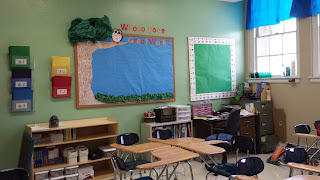Two weeks in and I can really see the things that are working and the things that just aren't going to happen in my classroom. I am really happy with the way the year has started off and I'm excited to see how my kids do this year. One of the biggest things I notice is that even though I have ALWAYS had high expectations, this year they seem the highest they have ever been. I'm not sure why or what changed in me to make this happen, but I like it and the kids seem to be responding!
What's Working
1. So I will start off with the biggest surprise of all (to me) and that is the "whole brain teaching" strategy of "Class, Yes" and the scoreboard. I am using the Class/Yes, with all classes, but I'm only using the score board with 7th grade. Always liked the Class/Yes idea for getting their attention because it makes them respond and then be quiet, I've always done the "hands up" for attention and while it works really well for our school, for example when we are in the auditorium or cafeteria, its not so great for the classroom as I was never able to get 100% participation. With Class/Yes, I am getting that 100% I also might get into other types of call/response phrases after a while, just because I think its fun and I'm always looking for ways to put fun into my math class!! Here is a list I found on pinterest:
http://www.pinterest.com/pin/193303008978990418/
My 7th graders really like the scoreboard and I can do things like give them a frowny point instead of Shhhhing them when they are too loud for example. That has been great as I teach them my expectations. Right now there is no prize/consequence with the game but I'm thinking that will be coming soon.
2. Next up is my SWAG sign! When I notice them starting to drift, daydream, lose focus, etc, I just say "Show me your SWAG" and they all sit up straight no questions asked! I don't want to jinx myself, but even my tough guys are buying it! Love it!!! Sometimes I say "Table 1 sure has SWAG" and they all follow whatever Table 1 is doing or whoever is following the rules. Another thing I noticed yesterday was that when I taught the procedure for "SWAG" we went through each letter, and I didn't really model the sitting up straight part, just what it didn't look like. Well I've noticed that when I ask to see their swag some of them are even clasping their hands on the desk, it is too cute and so funny to see these "too cool for school" preteens doing exactly what I want them to do!
3. Something I call the Circle Tracker. I made a list of the skills that I was looking for in the chapter. I put it in a spreadsheet with all of their names.While they are working (workshop time) I go around with my clipboard, check certain problems, ask directed questions and get a feel for their mastery of the skill. If they have no clue, I leave the box blank, sort of get it I put a circle, get maybe one small thing wrong, I put a line through the circle and if they show complete mastery its a plus sign in the circle. We were required to do this last year and it just seemed overwhelming. Somehow this year, it just seems like a natural fit, and I think its due to the workshop model I am trying to implement. I like that the circle tracker gives me a really clear visual as to where the class is. Yesterday I noticed that only one of my 36 students could approximate a cube or square root on the number line so I focused my mini lesson on that.
4. Math workshop: I am so glad I read the book over the summer, it is one of those concepts that really changed the way I look at my teaching. At first I was going to classify this as "Almost working" because it doesn't quite look like the videos of math workshop that I've seen, but then when I went explain what exactly wasn't working yet I realized, its pretty darn close! I have to work on my timing and I now have two timers, one I use for the kids (
this one) and one I wear around my neck (
this one). The timing issue is also because I am just getting to know my students and the new textbook series oh and after transition times, I am only left with about 48 minutes for each class! It seems that my class right after lunch can be down to 38 minutes-that is just unacceptable and we are working on it. (We are a K-8 school with no bells since we all run on different class times.) Once we get the timing down things will go a lot smoother. I am definitely breaking the lessons in to 2-3 days, so that makes it look a tiny bit different too, but still effective for me-I think, since we are still in the middle of only one lesson right now!
What's not really going to work:
Flipping: I had originally envisioned doing videos for the skills content and then having students work on the juicy problems in class. This is just not going to happen. I am able to get the skills taught in the mini lesson and I noticed that each class needs them tweaked a little bit anyway, so my videos would not be effective for everyone. I will consider sending them to
virtualnerd.com, AFTER I teach them if they are struggling with homework or want more review for tests.























